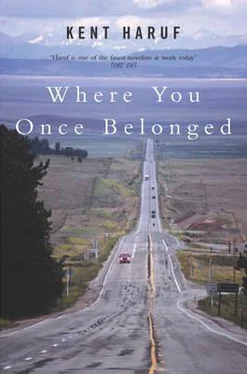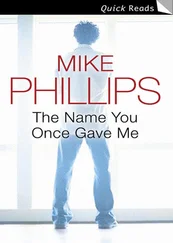Kent Haruf - Where You Once Belonged
Здесь есть возможность читать онлайн «Kent Haruf - Where You Once Belonged» весь текст электронной книги совершенно бесплатно (целиком полную версию без сокращений). В некоторых случаях можно слушать аудио, скачать через торрент в формате fb2 и присутствует краткое содержание. Год выпуска: 2004, Издательство: Pan MacMillan, Жанр: Современная проза, на английском языке. Описание произведения, (предисловие) а так же отзывы посетителей доступны на портале библиотеки ЛибКат.
- Название:Where You Once Belonged
- Автор:
- Издательство:Pan MacMillan
- Жанр:
- Год:2004
- ISBN:нет данных
- Рейтинг книги:5 / 5. Голосов: 1
-
Избранное:Добавить в избранное
- Отзывы:
-
Ваша оценка:
- 100
- 1
- 2
- 3
- 4
- 5
Where You Once Belonged: краткое содержание, описание и аннотация
Предлагаем к чтению аннотацию, описание, краткое содержание или предисловие (зависит от того, что написал сам автор книги «Where You Once Belonged»). Если вы не нашли необходимую информацию о книге — напишите в комментариях, мы постараемся отыскать её.
Where You Once Belonged — читать онлайн бесплатно полную книгу (весь текст) целиком
Ниже представлен текст книги, разбитый по страницам. Система сохранения места последней прочитанной страницы, позволяет с удобством читать онлайн бесплатно книгу «Where You Once Belonged», без необходимости каждый раз заново искать на чём Вы остановились. Поставьте закладку, и сможете в любой момент перейти на страницу, на которой закончили чтение.
Интервал:
Закладка:
So the fall passed in that way. I worked steadily at the newspaper office every day, editing and publishing the Holt Mercury , printing whatever was profitable and of interest locally without attempting to do anything that would take much effort, just the routine small-town-weekly-newspaper kind of thing. Then one evening at the Holt Cafe, after I had eaten supper, when Jessie brought the bill to the table I asked her if I could drive her home when she got off work. The evening had turned cool and I knew that she usually walked home.
“I’m sorry,” she said. “But I drove this time. I was late leaving the house so I decided to drive.”
“Oh. Well maybe another time.”
“Yes,” she said. “Why don’t you ask another time? But do you want anything else? Any dessert?”
“I guess not.”
She put the bill on the table and carried the dishes back to the kitchen. I finished my coffee. Well that was foolish , I thought. She doesn’t need you bothering her . I got up and walked over to the register to pay. Jessie was clearing another table. I waited for her, then she came back and rang up the bill and made change and I started to leave.
“But, Pat,” she said. “Wait. Would you like to come to the house? I could make some fresh coffee.”
“I would, if it’s all right.”
“I’ll be here another hour or so.”
“Okay.”
“Say about seven-thirty?”
“Okay.”
She laughed. “Sure that’s okay?”
I grinned back at her. “I’m real quick. I guess I’m out of practice.”
“I know you are,” she said.
I walked on outside. I thought of taking something to her, some cake or cookies to go with the coffee, but the bakery was closed and only the bars and liquor stores and the 7–11 were open now at this time in the evening. So I went back to the office and worked for an hour and then waited half an hour longer; then I locked up again and drove over to her apartment on Hawthorne Street.
TJ and Bobby were watching television in the front room when I walked up onto the front porch. I could see them through the window. I rang the doorbell and Jessie came to let me in. “This is Mr. Arbuckle,” she said. “He owns the newspaper.” Her sons looked at me. “Can’t you say hello?”
“Hello,” they said. Then they turned back to the television.
Jessie led me out to the kitchen. It was clean and bright, with space enough for a large table and four chairs. “Do you want to sit down?” she said. “I’ll get the coffee started.”
“You have a nice place here,” I said.
“It’s all right. Anyway, it’s not too expensive.”
I watched her making the coffee. She had changed clothes since coming home from the cafe; she was wearing a long-sleeved blue pullover now and faded Levi’s and her hair looked freshly combed. When the coffee began to perk she sat down across from me at the kitchen table.
I don’t know what we talked about that first evening — well yes, I do know. We talked about ourselves, about her childhood in Tulsa, her crippled mother and about her brothers and her father, and I told her a little of growing up in Holt. It was awkward at first. We drank several cups of coffee and at nine-thirty Jessie said, “Excuse me a minute,” and went into the front room. She told the boys they had to go to bed now. They turned the television off and came through the kitchen to enter the bathroom. I was still sitting at the table and as they passed through the room they looked suspiciously at me. When the bathroom door was shut I could hear them brushing their teeth and whispering to one another. Then they came out and stood beside the table while Jessie kissed them. “Go to bed now. And no funny stuff. Okay?”
They looked at me once more. “Good night,” I said.
“Good night,” TJ said. He poked at Bobby.
“What?”
“You’re supposed to tell him good night.”
“I don’t even know who he is.”
“Tell him good night anyway.”
“Good night,” Bobby said. Then he walked out of the kitchen and TJ followed him.
“Oh my,” Jessie said. She laughed and made a face. “Such manners.”
“It’s all right. You’ve done a terrific job raising them. They’re good kids.”
“Do you think so?”
“Yes. You have a right to be proud of them.”
She reached across the table and touched my hand. “Thank you. You’re a nice man. Did you know that?”
“I’m not so nice.”
“You seem to be.”
Later I stood up and Jessie walked with me to the front door and out onto the porch. We stood looking out across Hawthorne Street toward Harry Smith’s horse pasture. There was a half-moon and you could just make out the shapes of soapweed and sage against the dark native grass.
“Thanks for the coffee,” I said. I started down the steps.
“Pat.”
“Yes?”
“Do you think you’ll be eating at the cafe tomorrow?”
“I don’t know. Probably.”
“Then I probably won’t drive my car to work.”
“Then I probably will drive mine,” I said.
“There,” she said. “You see? You’re not as much out of practice as you thought.”
I laughed. It was the first time I’d laughed in months. “Maybe it’ll all come back to me.”
“I think it will.”
After that it was a wonderful fall and winter. I wasn’t lonely anymore, and I think perhaps they were good weeks and months for Jessie too. After that first evening we saw each other nearly every day. When she had finished work at the Holt Cafe I would drive her home to the apartment, and then while the boys watched TV or did schoolwork we would sit in her kitchen and talk. We talked for hours. I had never talked with anyone as much as I did with her, telling her things I had not told anyone before, things which I hadn’t known I’d thought until I heard myself saying them to her. It was a new experience for both of us to be unguarded with someone, and as the months passed I began to stay at her apartment later into the night, talking and drinking coffee, and then after the boys were in bed and asleep often we would move back to her bedroom. She was a beautiful woman and very warmhearted and generous in bed, and I looked forward to seeing her every day, to talking to her and being with her. I thought about her constantly.
She had Sundays off and during the week we made plans to do something together with the boys. We took drives out into the country, or drove to another town or went to a movie, and if there had been a rain or if the wind had blown hard we hunted arrowheads in the bare fields of the farmers I knew. In the spring TJ and Bobby each found a number of pieces of flint and a few complete points. We ordered books about Plains Indians and about arrowheads and read them together, and one Sunday we spent an afternoon constructing a glass display case to put the points in. The boys lined it with dark velvet. They were pleased with what they had made and I believe they came to think that I was all right too. I certainly thought they were. They were wonderful little boys and I was crazy about their mother.
There was one day in the summer that we drove to Denver. It was a Sunday in August. We left Holt about noon, driving west across the High Plains past fields of wheat stubble and green corn and the dry pastures, and after a while we began to see the mountains rising up toward us, and then in a couple of hours we were in Denver. We wanted to make an afternoon of it, to take the boys to Wet World where there was a water slide, and afterward we planned to eat at Casa Quintana.
It was about two-thirty when we arrived at Wet World on South Colorado Boulevard. We took our swimming suits and went inside. I bought the tickets at the counter and took the boys back to the men’s dressing room while Jessie went to change in the women’s. The boys were bashful getting undressed in front of me; they turned their backs and pulled their suits up and draped towels around their necks. When we were ready we went outside and waited for their mother. Then she came out, and my god she looked lovely. Every time I saw her I felt the same way. She was wearing a two-piece suit, with the towel wrapped around her hips. She was naturally brown-skinned and now late in the summer she was a wonderful dark color.
Читать дальшеИнтервал:
Закладка:
Похожие книги на «Where You Once Belonged»
Представляем Вашему вниманию похожие книги на «Where You Once Belonged» списком для выбора. Мы отобрали схожую по названию и смыслу литературу в надежде предоставить читателям больше вариантов отыскать новые, интересные, ещё непрочитанные произведения.
Обсуждение, отзывы о книге «Where You Once Belonged» и просто собственные мнения читателей. Оставьте ваши комментарии, напишите, что Вы думаете о произведении, его смысле или главных героях. Укажите что конкретно понравилось, а что нет, и почему Вы так считаете.












